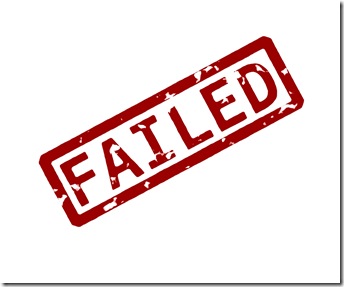How to Make Sure You’ll Fail to Achieve Your Goals
Don’t write down your goals – that’s pretty much it at a basic level.
NOT writing down your goals is almost a guarantee of failing to achieve them. This is true for your financial objectives, personal life, business career, projects, and perhaps most importantly right now, your job search.
I wonder how many managers/executives conducting a current job search do not have written goals (not tasks and activities) which are revised weekly and monthly.
Who carries these goals with them and looks at them frequently?
I recently read an article posted on a well known blogger’s website, John Chow, that referenced a rumored Harvard study which found that the 3% of the population which makes the effort to write down their goals makes over ten times as much as the other 97% combined.
Although the study was not true, many studies and research projects have been conducted that indicate written goals lead to higher levels of execution, accomplishment, success, and focused effort.
Many candidates struggle in their job search because they work “in their job search” NOT “on their job search”. Michael Gerber, in his famous book, The E-Myth, extended this same concept to the failure of entrepreneurs in building their businesses. Entrepreneurs tend to work in their business instead of on their business – and consequently fail as a result. They spend too much time absorbed by the activities and tasks of their business – NOT the vision, goals, and objectives of what they would like to accomplish.
So – how do you work on your job search and develop appropriate goals that lead you to finding a great job opportunity in half the time it would normally take your peer group? My partner, Brad, and I have developed a simple and easy step-by-step approach that has been proven to dramatically reduce the time it takes to complete a job search. We call this job search structured approach the Career Success Methodology. You read about the details of each of the steps, including building your Personal Success Profile, developing a targeted plan to identify new opportunities, and creating a Compelling Marketing Statement on our website.
We have an extensive e-commerce section with a catalog of products and services to support your implementation and execution of the Career Success Methodology, including a Resume Kit, a comprehensive Home Study Job Search Kit,and other tools to develop a powerful job search.
Best part of our website is the extensive FREE resources we’ve developed for those conducting a job search, including samples, templates, checklists, scorecards, and the audio library from our weekly Internet Radio Talk Show.
Finally, don’t forget to join our LinkedIn Job Search Discussion Group – one of the fastest growing groups on LinkedIn for job seekers. Join the vibrant and active discussion around best practices in running an effective job search.
Barry Deutsch















